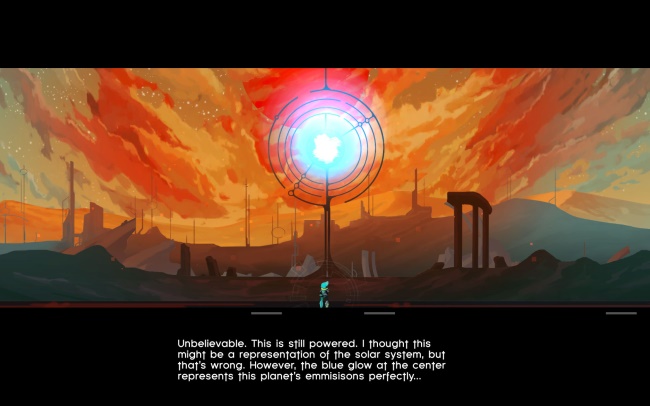How Elegy for a Dead World Coaxes Forth Creativity

Writing is not the act of putting words on a page. It includes that, to be sure, but there is so much more to the process than simply creating the result. Your mind stretches and spaces out; thoughts drift away and return, adjusted by some insight, great or small. The act of writing is as much thought as it is word.
Elegy for a Dead World is about writing, remembering, loss and perspective. The premise is simple – you are the last person to witness the wreckage of long-forgotten worlds. Great calamities have taken place, and the only thing standing in the way of these worlds disappearing from the continuum of history is you.
If you buy into it as a player, the scope of the responsibility can be intimidating. If you’re timid about your creative writing capabilities, the core concept of having to write to literally save the world can be terrifying. For such a simple premise, the stakes seem inordinately high.
But it wasn’t always like this.
“I needed a break”
In development by members of the Indie Game Collective in Boston, Elegy was originally conceived by Dejobaan Games’ Ichiro Lambe as a break from intense development on other projects.
“I was at the point where I needed a break. You know crunch, right? You get burned out,” Lambe says. “So I said I need to take a break, and since I’ve been 10 years old, I’ve had this concept for a game where you walk to the right and that’s the whole game.” Popcannibal’s Ziba Scott and Luigi Guatieri joined to provide art, and after Scott suggested to theme the project in British Romantic poetry, a distinct atmosphere began to emerge.
“Creative people are curious, they are intrigued by what they might create, they are curious about the physical world around them, relationships, and the inner world of ideas and emotions.”
–From The Creative Personality, David Lyman’s essay of 34 characteristics that lead to greater creativity
As they were writing and sketching ideas, they invited fellow Collective member Eric Asmussen of 82apps to review the drawings so far and provide feedback. With no text in place to provide context, Asmussen’s interpretation of the events that had doomed the extinct civilization was completely different from what the team had originally conceived – yet his interpretation was still consistent with the sketches.
In this gulf between the team’s original authored intent and the player’s experience, Lambe saw an opportunity to engage players’ creativity in a subtle way.
“You know the way that people read the Bible, or they read any work of art and they interpret it, and they argue about its meaning?” says Lambe. “And some people will say one thing and it’s supported by one fact, and others say another thing and it’s supported by other facts. I would love for Elegy to make people realize there was specific meaning behind the worlds we created.”
With this new objective in mind, the team revisited the project’s basic method of interaction. Instead of just walking right, players would now add their own text in an attempt to paint their own picture of what had taken place. Players could choose from structured prompts for prose or verse, or opt for totally free writing.
Instead of just consuming the world, players would now co-create it alongside Lambe, Scott and Guatieri.
“Forget Myers-Briggs. A study out of BI Norwegian Business School has determined the signposts of a “creative” personality. Conducted by Professor Øyvind L. Martinsen, the study posed 200 questions to 481 people.
The subjects fell into three categories. One group of “baseline” subjects such as lecturers or managers, and two groups of people who are generally considered to be creative, such as students of advertising and performing artists. Martinsen says he found meaningful differences between the creative and noncreative groups.”
–How To Tell If You’re Creative (Hint: You Might Be a Bit of a Jerk), Fast Company
Elegy had transformed from a simple walking exploration game to a tool designed to tease creativity out of the player – something that Lambe strongly believes in.
“There’s creativity in everybody; there’s creative writing in everybody. You go to Reddit, to Imgur, to Facebook, and there’s a lot of creative output there. People write things that are very clever, very touching, very insightful. So I would like to push that forward, creative writing in games. And I would love to see people say, ‘Elegy is giving me just enough of a framework to get into my own creative writing.’”
The World Begins With You
At first, Elegy gives off an air of sad futility. As you tread through empty landscapes, the chaos has already been wrought, the world already ended – what good can you really do?
Yet in exploring the ruins, in trying to put to words an explanation or empathetic declaration or final remembrance, players who may be embarrassed by their writing ability transcend their fears in order to honor the dead. As they fall deeper in sync with the fate of this lost world, their own worries and insecurities fade away.
The true elegy that takes place does not honor the legions of deceased inhabitants of whatever made-up society your avatar wanders. The true elegy marks the death of the concept of yourself as a non-creative entity.
And from the ashes of imaginary planets, a new you rises – grounded, humbled, solemn, and joyful – all at the same time.
